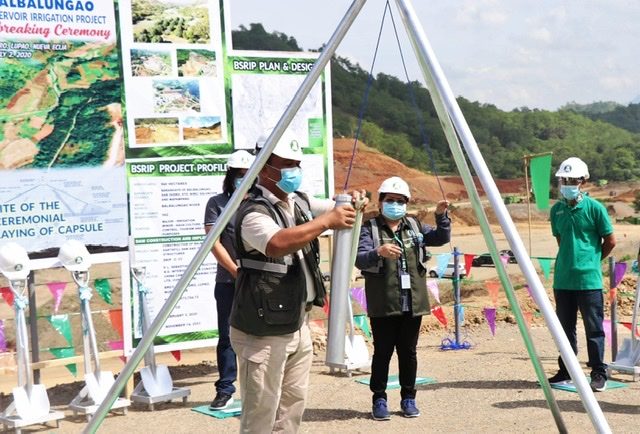NIA chief Ricardo Visaya and UPRIISdepartment manager Rosalinda Bote lead the capsule-laying rites. Photo by Armand M. Galang
LUPAO, Nueva Ecija –– At least 840 hectares of rice fields are expected to be more productive amid the rally for food sufficiency with the construction of a P1.3-billion irrigation project here.
Called Balbalungao Small Reservoir Irrigation Project (BSRIP), the facility will serve at least 562 farming families in the villages of Balbalungao, San Isidro, Sto. Niño, Salvacion, and Mapampang, all of this town.
National Irrigation Administration chief Ricardo Visaya said that aside from providing irrigation to crops, BSRIP is also designed for power generation.
Visaya, who led the groundbreaking ceremonies along with Engr. Rosalinda Bote, department manager of the Upper Pampanga River Integrated Irrigation System (UPRIIS) and other officials on Thursday, said only 61 percent of the country’s irrigable lands have been fully served as yet.
“So, malaking area pa ang i–irrigate natin. At least pag natapos ito mama-minusan tayo ng 840 hectares malaking bagay yan,” he said.
The emerging effect to the country’s food requirement of the coronavirus disease pandemic underscores the importance of the BSRIP, according to Visaya, a former chief of staff of the Armed Forces of the Philippines.
“Lalo na ngayon na medyo magkukulang tayo ng supply ng bigas dahil nga yung importation from other countries ay naka-cancel because of the pandemic,” he said.
Bote said the contractor has recorded a “5-positive” in its works despite the lockdown. She explained that the pace of construction was five percent better than targeted as work was allowed to continue with the workers locked down on-site subject to the standards prescribed by the IATF.
The project is set to be completed in November 2023 but officials believe it can be earlier than that.
Cabinet Sec. Karlo Alexie Nograles, NIA chair, noted the groundbreaking was the first of such activity after the lockdown due to the pandemic. He delivered his message through a pre-recorded video.
Per provincial agriculture’s office, the project can result to a modest increase of 20 cavans of palay per hectare which would mean over P11 million, at P700 a cavan, additional income to local farmers per cropping season or some P23 million for one year.
“What more kung ang farmers po natin ay maga-adopt ng integrated technology, magdodoble po ito magiging six to seven metric tons,” said Dr. Jovy Agliam of PAO.
The project profile shows BSRIP is also for aquaculture, flood control, and tourism.
The project falls under UPRIIS Division I headed by Engr. Fix Teaño, Jr. acting division manager.





